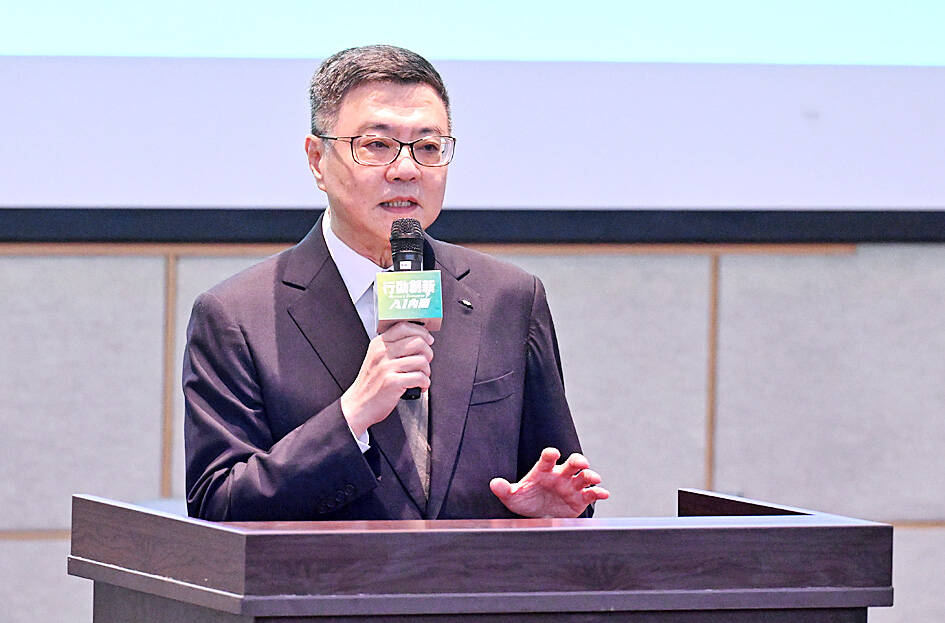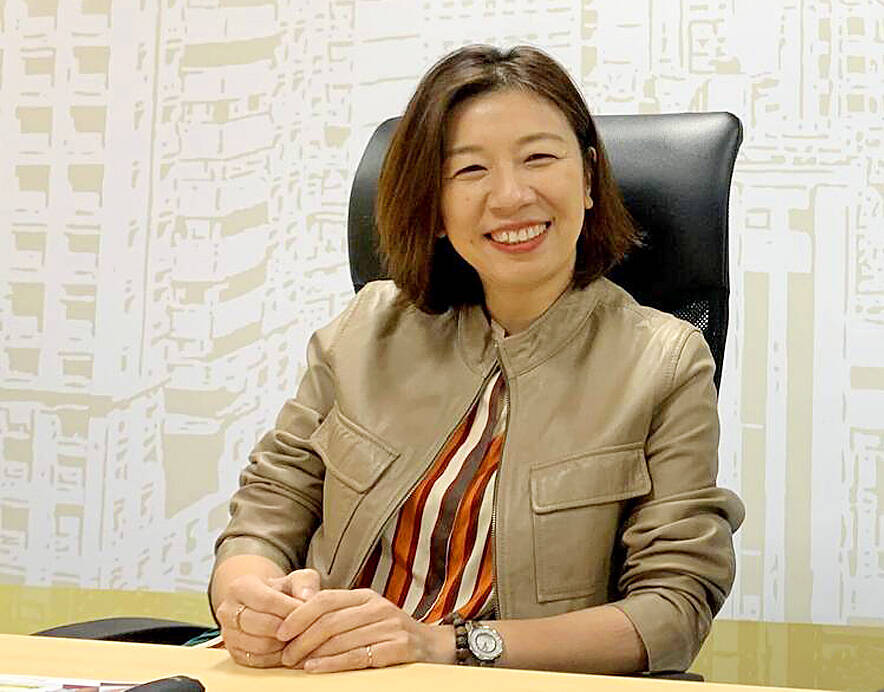The Democratic Progressive Party (DPP) yesterday announced 15 new deputy ministers, with premier-designate Cho Jung-tai (卓榮泰) saying he expects the ministries to work together to build a technologically innovative and public interest-focused administration.
Although the list did not include names for deputies in the Ministry of Foreign Affairs and the Ministry of Defense, minister of foreign affairs-designate Lin Chia-lung (林佳龍) has reportedly selected Representative to France Francois Wu (吳志中) as deputy minister, which Cho has agreed to.
Yesterday’s list showed that Maa Shyh-yuan (馬士元), an associate professor of urban planning and disaster management at Ming Chuan University, and Tung Chien-hung (董建宏), an associate professor at National Chung Hsing University’s landscape and recreation program, would become deputy ministers of the interior.

Photo: Liu Hsin-de, Taipei Times
The new deputy ministers of education would be former legislator Chang Liao Wan-chien (張廖萬堅) and Yeh Ping-cheng (葉丙成), a professor in National Taiwan University’s Department of Electrical Engineering.
During his two terms in the legislature, Chang Liao was on its Education and Culture Committee, while Yeh is the founder of online learning platform PaGamO and BTS, an experimental education institution for autonomous learning.
Former legislator Lin Ching-yi (林靜儀) and Civil Service Protection and Training Commission Deputy Minister Lue Jen-der (呂建德) were named deputy ministers of health and welfare.

Photo: Tsai Shu-yuan, Taipei Times
Lin was a gynecologist, while Lue, who was the director of the Taichung City Government’s Social Affairs Bureau, has expertise in National Health Insurance, political economy and social welfare.
The new deputy ministers of agriculture would be Agriculture and Food Agency Director-General Hu Jong-i (胡忠一) and Kaohsiung District Fishermen’s Association chairman Huang Chao-ching (黃昭欽).
Deputy Minister of Transportation and Communications Chen Yen-po (陳彥伯) would remain in his post, while Railway Bureau Director-General Wu Sheng-yuan (伍勝園) would become a new deputy minister of transportation and communications.
Deputy Minister of Digital Affairs Herming Chiueh (闕河鳴) would also remain in his position, while L Labs Inc (艾爾科技) president Lin Yi-jing (林宜敬) would become the other deputy minister.
Lin Yi-jing had been a researcher at IBM, a deputy manager of the engineering department at Compeq Manufacturing Co (華通電腦) and director of new product research and development at Trend Micro Inc.
National Taipei University law professor Chen Yen-liang (陳彥良) would become vice chairman of the Financial Supervisory Commission, while National Taiwan University Department of Bio-Industry Communication and Development professor Peng Li-pei (彭立沛) would be deputy minister of the National Development Council.
National Taiwan University School of Design and Innovation dean Chen Bing-Yu (陳炳宇) and National Applied Research Laboratories president Lin Faa-jeng (林法正) were named National Science and Technology Council deputy ministers.
The new Public Construction Commission deputy ministers would be Taiwan Jury Association president Chen Wei-hsiang (陳為祥) and Pingtung County Department of Urban and Rural Development director Lee Yi-der (李怡德).
Deputy ministers of finance Frank Juan (阮清華) and Lee Ching-hua (李慶華), deputy ministers of environment Yeh Jiunn-Horng (葉俊宏) and Shih Wen-chen (施文真), deputy ministers of culture Lee Ching-hwi (李靜慧) and Sue Wang (王時思), deputy ministers of labor Wang An-pang (王安邦) and Hsu Chuan-sheng (許傳盛), and Deputy Minister of Economic Affairs Chen Chern-chyi (陳正祺) would remain in their posts.

MAKING WAVES: China’s maritime militia could become a nontraditional threat in war, clogging up shipping lanes to prevent US or Japanese intervention, a report said About 1,900 Chinese ships flying flags of convenience and fishing vessels that participated in China’s military exercises around Taiwan last month and in January last year have been listed for monitoring, Coast Guard Administration (CGA) Deputy Director-General Hsieh Ching-chin (謝慶欽) said yesterday. Following amendments to the Commercial Port Act (商港法) and the Law of Ships (船舶法) last month, the CGA can designate possible berthing areas or deny ports of call for vessels suspected of loitering around areas where undersea cables can be accessed, Oceans Affairs Council Minister Kuan Bi-ling (管碧玲) said. The list of suspected ships, originally 300, had risen to about

DAREDEVIL: Honnold said it had always been a dream of his to climb Taipei 101, while a Netflix producer said the skyscraper was ‘a real icon of this country’ US climber Alex Honnold yesterday took on Taiwan’s tallest building, becoming the first person to scale Taipei 101 without a rope, harness or safety net. Hundreds of spectators gathered at the base of the 101-story skyscraper to watch Honnold, 40, embark on his daredevil feat, which was also broadcast live on Netflix. Dressed in a red T-shirt and yellow custom-made climbing shoes, Honnold swiftly moved up the southeast face of the glass and steel building. At one point, he stepped onto a platform midway up to wave down at fans and onlookers who were taking photos. People watching from inside

Japan’s strategic alliance with the US would collapse if Tokyo were to turn away from a conflict in Taiwan, Japanese Prime Minister Sanae Takaichi said yesterday, but distanced herself from previous comments that suggested a possible military response in such an event. Takaichi expressed her latest views on a nationally broadcast TV program late on Monday, where an opposition party leader criticized her for igniting tensions with China with the earlier remarks. Ties between Japan and China have sunk to the worst level in years after Takaichi said in November that a hypothetical Chinese attack on Taiwan could bring about a Japanese

The WHO ignored early COVID-19 warnings from Taiwan, US Deputy Secretary of Health and Human Services Jim O’Neill said on Friday, as part of justification for Washington withdrawing from the global health body. US Secretary of State Marco Rubio on Thursday said that the US was pulling out of the UN agency, as it failed to fulfill its responsibilities during the COVID-19 pandemic. The WHO “ignored early COVID warnings from Taiwan in 2019 by pretending Taiwan did not exist, O’Neill wrote on X on Friday, Taiwan time. “It ignored rigorous science and promoted lockdowns.” The US will “continue international coordination on infectious